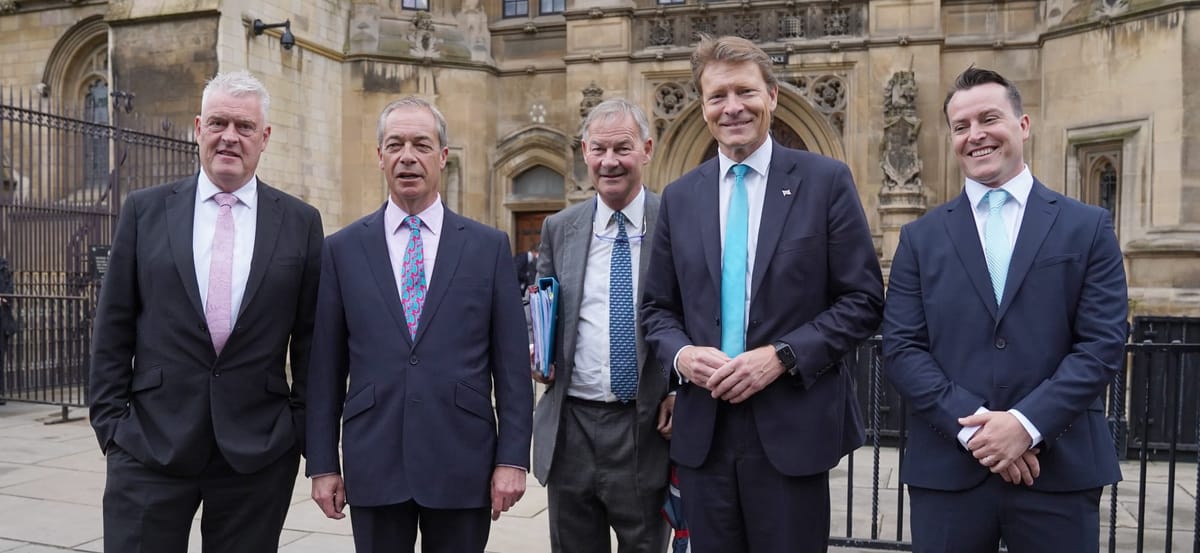Reform UK: Patriots?

In an era of heightened rhetoric and political grandstanding, the term ‘patriot’ has been wielded by many without adequate scrutiny. Reform UK, a party that seeks to position itself as a champion of British values, merits close examination. While its rhetoric appeals to national pride and sovereignty, a deeper analysis reveals a reliance on foreign influences that contradicts the principles of true patriotism.
Patriotism is about commitment to one’s country, its unique identity, and its long-term welfare. Reform UK’s increasing alignment with American political culture raises serious doubts about its dedication to British values. Nigel Farage’s close association with Donald Trump exemplifies this trend. While Trump’s methods may appeal to some, his priorities are distinctly American and ill-suited to Britain’s political and cultural landscape.
Adding to this concern are rumours that Elon Musk may soon become a substantial donor to Reform UK. Musk, a figure synonymous with American corporate power and ideology, represents a stark departure from any claim to British-focused policy or independence. Accepting substantial funding from Musk would likely compromise the party’s decision-making and its ability to act solely in Britain’s interests. Financial dependency on a foreign billionaire inevitably raises questions about influence and control, and whether policies would begin to favour American corporate or geopolitical interests over British needs.
The concern about American encroachment on British sovereignty is not new. Historically, the United States has played a significant role in shaping Britain’s economic and political landscape. After the Second World War, the Marshall Plan provided much-needed financial aid to a devastated Europe, including Britain. While this support was crucial, it also came with strings attached, encouraging closer alignment with American economic principles and establishing a foundation for US influence.
In the 1980s, Margaret Thatcher’s government embraced the so-called ‘Big Bang’ financial deregulation, heavily influenced by the ideas of American economist Milton Friedman and encouraged by figures like Ronald Reagan. This move transformed London’s financial sector into a global hub but also increased dependency on American markets and institutions. The Organisation for Economic Co-operation and Development (OECD), another post-war creation, further institutionalised American-style capitalism across Western economies, often prioritising multinational corporate interests over national sovereignty.
Critics have long argued that the United States has viewed Britain and its Empire's economic assets—from its financial sector to its industrial base—as opportunities for expansion and control. Reform UK’s apparent openness to American funding and ideology could pave the way for further erosion of Britain’s autonomy, aligning its policies more closely with US corporate and geopolitical goals.
Farage’s frequent appearances on US media platforms, often criticising British policies, signal his growing alignment with American-style political discourse. His commentary on US politics further illustrates a transatlantic ideological convergence, with Reform UK increasingly adopting strategies and narratives more typical of American political campaigns. This trend is not just cosmetic; it reflects a fundamental shift in the party’s orientation towards external validation and resources.
Reform UK’s policy positions further demonstrate potential alignment with American interests. For example, the party’s stance on deregulation aligns closely with US corporate priorities. Advocating for reduced environmental and labour protections—under the guise of promoting business growth—could open British markets to American corporations, potentially at the expense of local industries and workers. Similarly, its emphasis on lower taxation echoes American conservative economic policies that prioritise short-term corporate gains over long-term societal investment.
Britain’s challenges require solutions grounded in its unique context. Importing the polarised and personality-driven politics of the United States undermines the traditions of Britain’s parliamentary system. By emulating these foreign models, Reform UK risks eroding the very institutions and values it claims to protect.
True patriotism demands a focus on building a vision for Britain that reflects its strengths, traditions, and aspirations. It is not about borrowing from foreign playbooks or seeking validation from overseas figures. Reform UK’s increasing reliance on American influence—from ideological inspiration to potential financial support—raises questions about its commitment to Britain’s independence and unique character.
A genuinely patriotic party would prioritise home-grown solutions and foster unity within Britain, addressing its challenges with a distinctly British perspective. Reform UK’s current trajectory suggests otherwise, making its claim to be the standard-bearer of British patriotism difficult to sustain.
